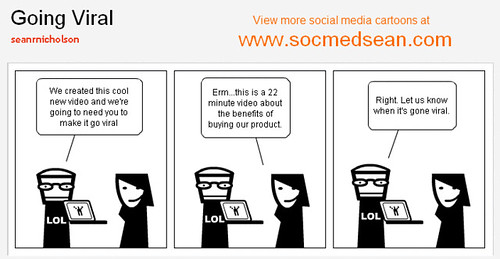Success in social media has more to do with the underlying principles, and less with the visible tools or tactics used.
So it’s easy to get the wrong idea or impression being on the outside, looking in.
But the problem with misconceptions is that they give you a false belief, and waste your resources. Instead, your limited time, energy and money should have been spent on other methods.
Here are 3 social media misconceptions that can destroy your marketing strategy.

Image courtesy of seanrnicholson
Misconception #1: Efficiency Doesn’t Equal Effectiveness
Social media opens up all types of doors. The possibilities and opportunities are virtually limitless.
But that’s also part of the problem. Don’t confuse efficiency with effectiveness. It doesn’t matter how many hours you work, tweets you send, or followers you have.
Take a step back and think about why you’re even tweeting in the first place.
- Start with a goal: There are three main goals in social media: (1) Awareness, (2) Customer loyalty, and (3) sales. Pick one, identify actionable metrics that support your goal, and then figure out how you’re going to move results.
- Reverse engineer success: Now how you’re going to reach that goal? Write down each step, in reverse, until you get to where you are right now.
- Identify highest ROI activities: Tweeting all day might not be the best way to increase Twitter followers. Instead, think outside the box and come up with new ways to grow your social media presence.
- Prioritize and set boundaries: Your time should have an opportunity cost. So if you eliminated a few distractions that cut down your productivity, you should be able to free up time for other things or new interesting projects.
- Be disciplined: Give yourself accountability publicly declaring your goals and intentions, or working closely with someone else. This gives you external pressure to stay on task. And it’s easier to force yourself to avoid distractions.
Your impact is more important than your inputs. → Click to Tweet
Misconception #2: Serendipity is Not a Marketing Strategy
One of the biggest benefits of social media marketing is that people – complete strangers – will retweet your updates and share your content.
This serendipity is online word of mouth, and it gives your message the ability to spread faster than ever before.
But it’s not a strategy.
You can’t sit around, waiting, hoping and wishing for others do your marketing for you.
Instead, you have to give your marketing campaign a push.
Other people will spread your message, but only if you reach enough people first.
- Tap your marketing assets like email newsletter or existing website traffic
- Get press from bloggers and other journalists
- Find syndication partners who will distribute your message
- Or create your own buzz with promotions and advertising
If you expose your message to enough people ahead of time, then it will take off.
But you need to be the one who makes the first initial effort.
Because viral marketing doesn’t just happen on it’s own.
Misconception #3: Social Media Doesn’t Convert Directly
Someone recently sent me an email and said they have two weeks to market their new book.
She asked what she could do in that time, and my response was simple: advertise.
If you’re looking for a fast, easy, direct conversion, then you can still “buy” people’s attention and trust with advertising. That’s always a valid option if you have deep pockets and the return on your investment makes sense.
But if you think that’s how social media works, then you’ve already lost. Because the Achilles’s Heel of social media is trust and relationships. And those take years to payoff.
That means if you want to sell your products and services in the next two weeks, then you should have started marketing a year ago.
And just because it’s inexpensive, doesn’t mean it’s free. It’s still going to cost you something.
In this case, social media costs you time, energy and effort – that could be spent doing other things. And it can take months, or even years to acquire the skills and develop the relationships to actually see a positive return.
People find you through social media in a variety of ways. But buying a product isn’t typically one of them.
So don’t use social media to sell, but rather to nurture leads when they show interest and keep them engaged longer so they’ll purchase more frequently.
Because “new media” only refers to a change in technology.
The same fundamental marketing strategies still apply.


